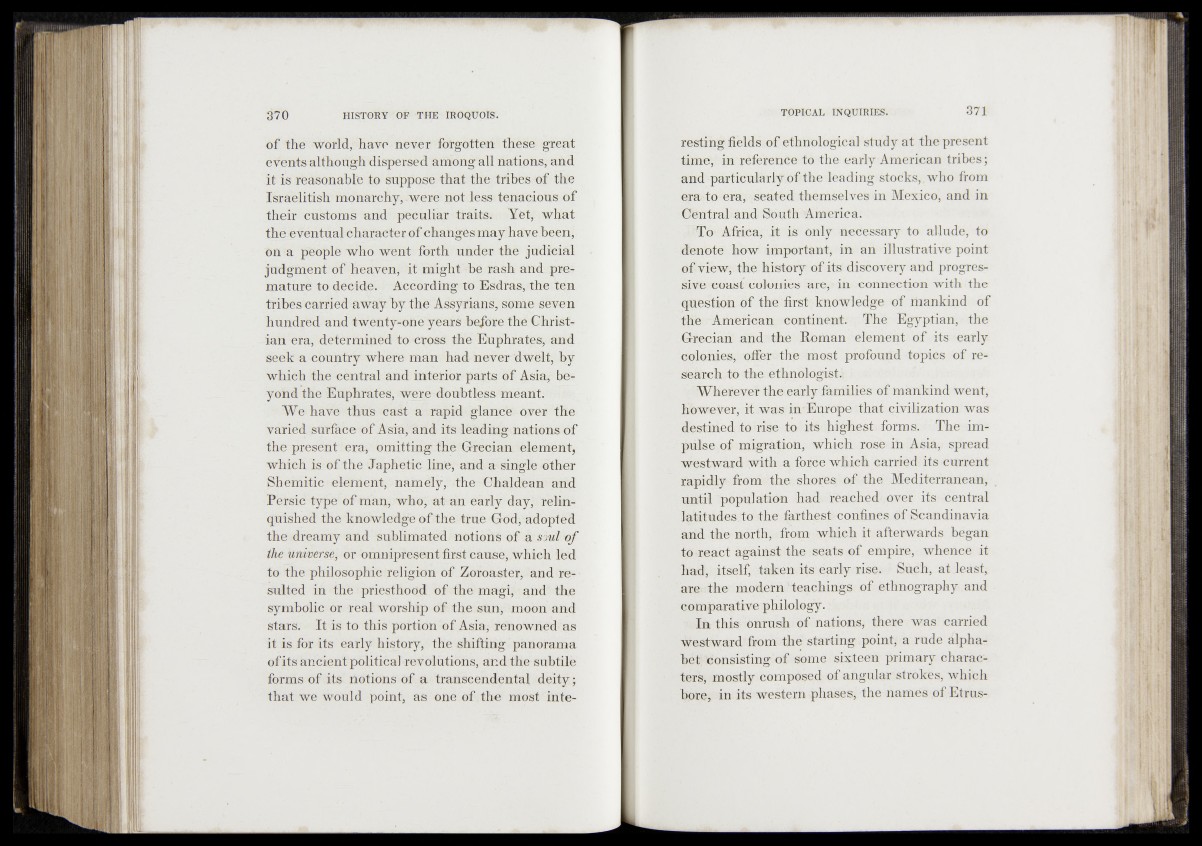
of the world, have never forgotten these great
events although disperse d among all nations, and
it is reasonable to suppose that the tribes of the
Israelitish monarchy, .were riot Jess tenacious, of
their customs and peculiar traits* Yfef what
the eventual character Of changes may have been,
On a people who went forth under the judicial
judgment of heaven, -it might'-be rash and prey
mature to decide. According toEsdras, the ten
tribes carried away by the Assyrians, some seven
hundred and twenty-one years before the Christian
era, determined to cross the Euphrates, and
seek a country where man had never "dwelt, by
which the central and interior parts of Asia; beyond
the Euphrates, were-doubtless meant.
We have thus cast a rapid glance over the
varied surface of Asfetj and its leading nations of
the present era, omitting thè Grecian ;element,
which is of the. Japhetic line, arid single other
Shemitic element, namely, -the-^Ghaldean and
Persic type of man, who, at-an early day," relinquished
thé knowledge oftthe true God; adopted
the dreamy and sublimated notioxfS of a sm ltf
the universe- or omnipresent first cause,: which ifed
to the philosophic religion of Zoroaster, and resulted
in the priesthood of the magi, and the
symbolic or real worship of the sun, moon and
stars. It is to this portion of Asia; renowned- as
it is for its early history, the shifting panorama
of its ancient political revolutions, and the subtile
forms of its notions of. a transcendental deity;
that we would point, as one of the most interesting
fields of ethnological study at the present
time, in référence to the early American tribes ;
a?nd particularly of the leading stocks,, who from
era to era;v4seatèd themselves in Mexico, and in
Gfentral And‘South America.
J-To- Africa, it is? only necessary to allude, to
dénoté ,hbw: important, in an illustrative point
©f* view, the history of its discovery and progressive
coast cotonfes are,-in eoMneetion withthe
question of thé first;knowledge of mankind of
thé--American continent. Thé Egyptian, the
Grecian and the Roman element of its early
colonie#»' offor the most profound topics -of research
to thafothnologist-i <
WHefeveï the early families of mankind went,
fibwever, it was in-Europe that eivièjzatiön. Was
destined to-rise to its highest, forms. The impulse
of migration, which rose in Asia, spread
Westward with a foiée which carried its current
rapidly: from the shores of the Mediterranean,
until population had* reached over its central
latitudes, to the farthest-confines of Scandinavia
and the north, from which it afterwards began
to-react against the seats of empire, whence it
had, itself taken ifo early rise. Such, at least,
are the modern ‘teachings of ethnography and
comparative philology. 11
In this Onrush of nations, there was carried
Westward from the starting point, a rude alphabet}
Consisting of some sixteen primary characters,
mostly composed of angular strokes, which
bom, in its western phases; the names -,of. Etrus